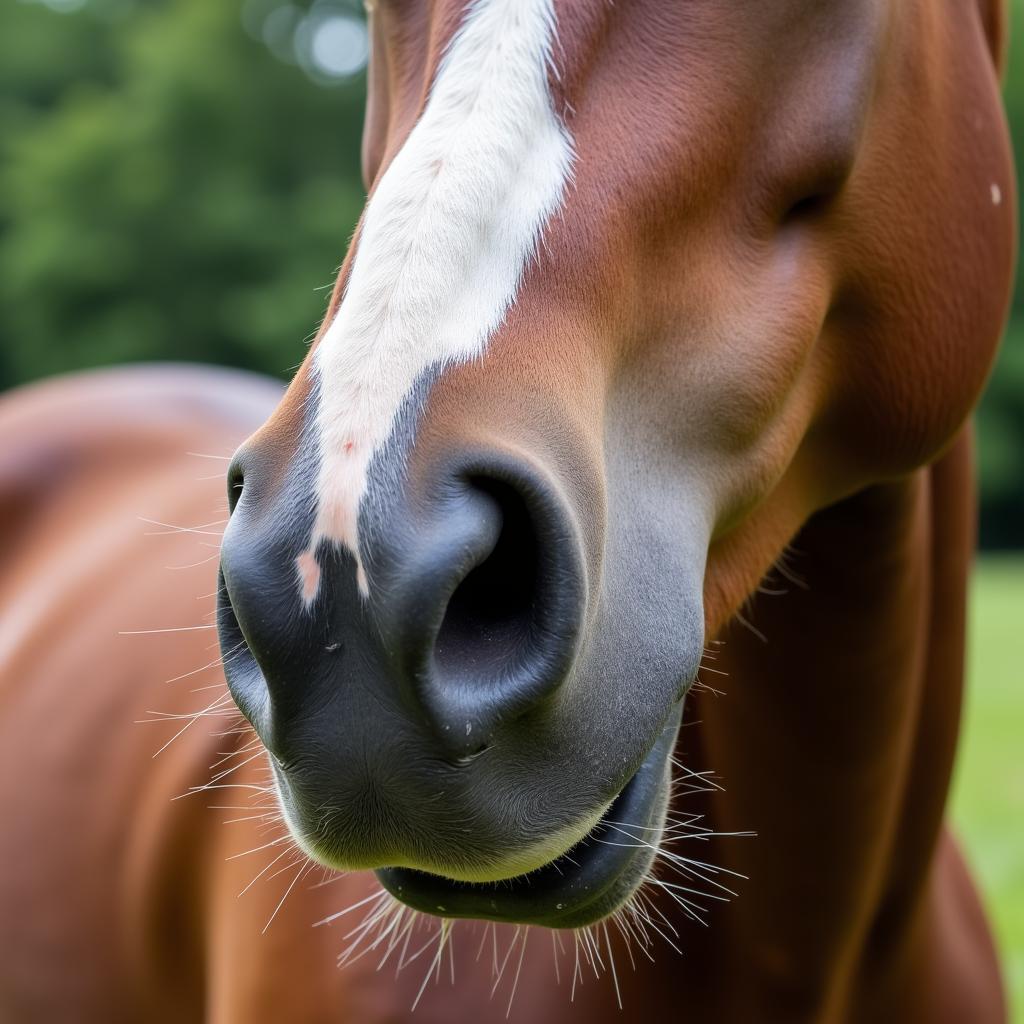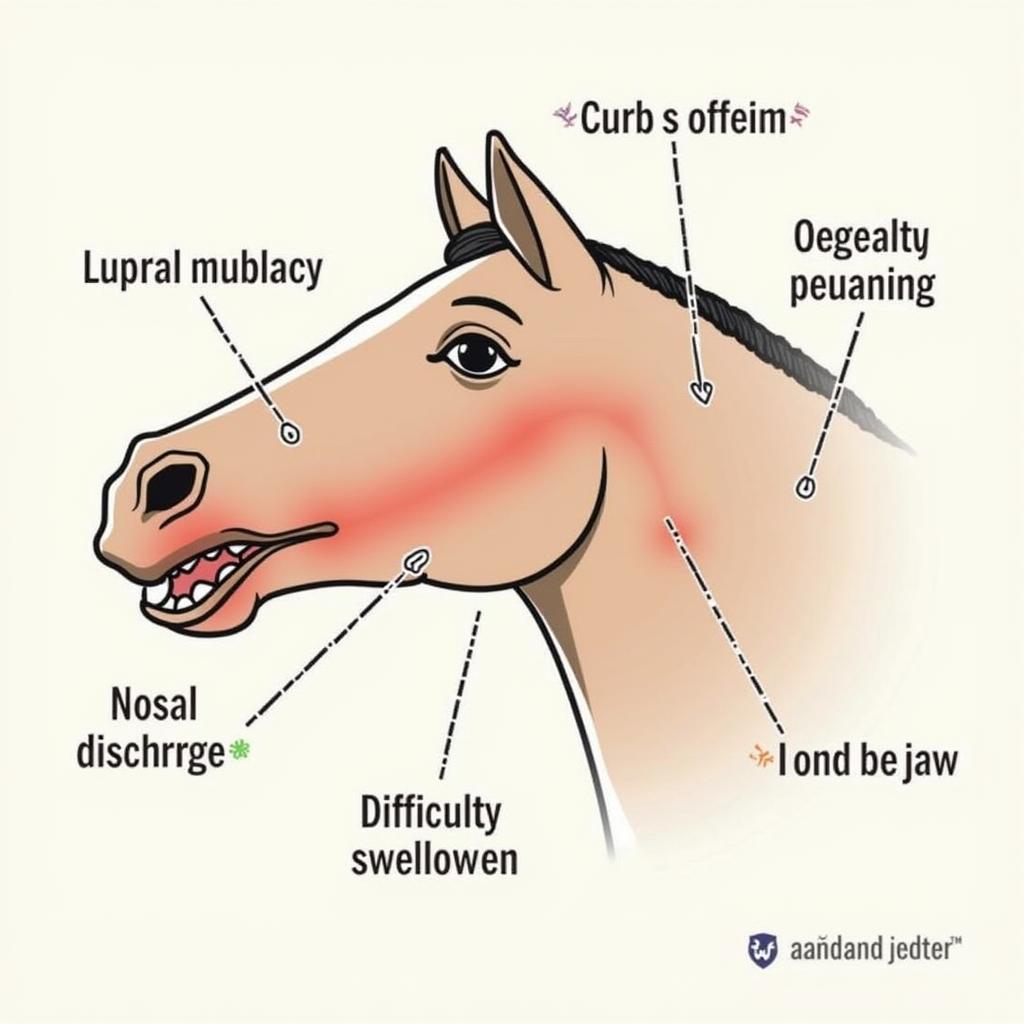A lump under your horse’s jaw can be an alarming discovery for any horse owner. While not all lumps are serious, it’s crucial to approach the situation with caution and seek veterinary attention to determine the underlying cause and appropriate treatment. This article will delve into the common causes of lumps under a horse’s jaw, associated symptoms, and treatment options to help you provide the best care for your equine companion.
What Causes Lumps Under a Horse’s Jaw?
 Horse Jaw Lump – Lymph Nodes
Horse Jaw Lump – Lymph Nodes
Several factors can contribute to the development of lumps under a horse’s jaw. Some of the most common causes include:
- Lymph Node Enlargement (Lymphadenitis): Lymph nodes are small, bean-shaped glands that play a vital role in the horse’s immune system. When fighting off an infection, these nodes can become inflamed and enlarged, resulting in noticeable lumps under the jaw.
- Strangles: This highly contagious bacterial infection, caused by Streptococcus equi, primarily affects young horses and can cause abscesses in the lymph nodes around the head and neck, including the area under the jaw.
- Tooth Root Abscess: An infection in a tooth root can lead to an abscess that forms under the jawline.
- Salivary Gland Obstruction or Infection: The salivary glands, located under the jaw, can become blocked or infected, resulting in swelling and lump formation.
- Trauma: A kick or other injury to the jaw area can cause swelling, bruising, and lump development.
- Tumors: While less common, tumors, both benign and malignant, can also manifest as lumps under the jaw.
Symptoms Associated with Lumps Under a Horse’s Jaw
 Horse Jaw Lump Symptoms
Horse Jaw Lump Symptoms
In addition to the presence of a lump, several other symptoms may accompany the condition, depending on the underlying cause:
- Swelling: The area around the lump may appear swollen.
- Pain: Your horse may exhibit signs of pain or discomfort when the area is touched.
- Heat: The skin over the lump may feel warm to the touch.
- Discharge: Nasal discharge, especially if thick and yellow or green, can indicate infection.
- Difficulty Swallowing: Swelling or pain can make it difficult for the horse to swallow properly.
- Lethargy: Your horse may seem tired or less active than usual.
- Loss of Appetite: Pain and discomfort can lead to decreased appetite.
- Fever: An elevated temperature is a common sign of infection.
Treatment Options for Lumps Under a Horse’s Jaw
It’s crucial to consult with your veterinarian for an accurate diagnosis and to discuss appropriate treatment options for your horse. Treatment will vary depending on the underlying cause of the lump and may include:
- Antibiotics: If the lump is caused by a bacterial infection, your veterinarian will likely prescribe a course of antibiotics.
- Anti-inflammatory Medications: Non-steroidal anti-inflammatory drugs (NSAIDs) can help reduce swelling, pain, and inflammation associated with the lump.
- Warm Compresses: Applying warm compresses to the affected area can help promote drainage and reduce swelling.
- Surgical Drainage: In cases of abscesses or other fluid-filled lumps, surgical drainage may be necessary to remove the accumulated fluid and promote healing.
- Surgery: For tumors or other growths, surgical removal may be the best course of action.
When to Contact Your Veterinarian
Early detection and treatment are crucial for ensuring the best possible outcome for your horse. Contact your veterinarian immediately if you notice any of the following:
- A lump under your horse’s jaw, especially if it appears suddenly or is rapidly growing.
- Any signs of pain, swelling, heat, or discharge associated with the lump.
- Your horse exhibits difficulty swallowing, loss of appetite, fever, or lethargy.
Frequently Asked Questions
1. Can a lump under my horse’s jaw go away on its own?
While minor swelling from trauma may subside independently, it’s crucial not to ignore any lump under your horse’s jaw. Consult your veterinarian for a proper diagnosis and treatment plan.
2. How serious is a lump under a horse’s jaw?
The severity of a lump under a horse’s jaw depends on the underlying cause. While some lumps are benign and easily treatable, others can indicate more serious conditions.
3. How can I prevent my horse from getting a lump under its jaw?
While not all causes are preventable, maintaining good hygiene in your horse’s environment, ensuring your horse is up-to-date on vaccinations (especially for Strangles), and providing proper dental care can help minimize the risk.
4. What is the prognosis for a horse with a lump under its jaw?
The prognosis for a horse with a lump under its jaw varies depending on the underlying cause, the size and location of the lump, and the horse’s overall health.
5. Can I still ride my horse if it has a lump under its jaw?
It’s best to refrain from riding your horse until a veterinarian has examined the lump and advised on appropriate activity levels. Riding with a lump, especially if it’s causing discomfort or affecting the horse’s ability to swallow or breathe, can worsen the condition.
Other Resources
For more information on equine health and wellness, visit the Justus Horses USA website.
In Conclusion
Discovering a lump under your horse’s jaw can be concerning, but it’s essential to remain calm and seek veterinary attention promptly. Early diagnosis and treatment are key to ensuring the best possible outcome for your equine partner. Remember, your veterinarian is your best resource for any questions or concerns regarding your horse’s health.
If you have any further questions or need assistance, our dedicated team at Justus Horses USA is here to help. Contact us at 0772127271 or [email protected]. We also welcome you to visit us at QGM2+WX2, Vị Trung, Vị Thuỷ, Hậu Giang, Việt Nam, where our team is available 24/7 to provide support and guidance.